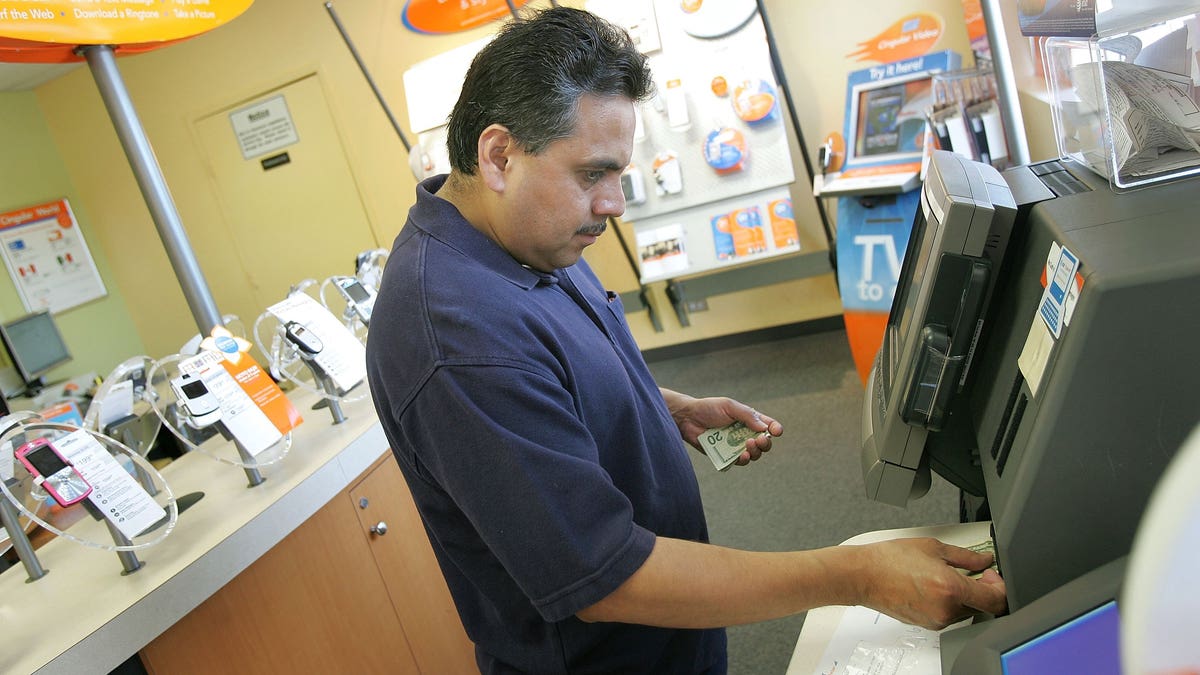
ELMHURST, IL - JUNE 12: Mexican-American Alberto Mejia pays his Cingular phone bill at a Cingular store June 12, 2006 in Elmhurst, Illinois. Cingular, the largest wireless carrier in the nation, is reportedly converting 420 of their stores in more than 40 cities in the US to, as Cingular says, "a bilingual concept," in that the stores will have both English and Spanish phone information, payment options and bilingual staff members. This Elmhurst store is one of the converted stores. (Photo by Tim Boyle/Getty Images) (2006 Getty Images)
How many times have you heard this: “Hey, this is America! Learn the language…speak English?”
I heard it as a child speaking with my grandparents and parents.
I heard it as a teenager when speaking to my friends.
I hear it as an adult when interacting with employees at the grocery store.
The U.S. Census Bureau released last week an online map pinpointing the vast host of languages (other than English) spoken in homes across the country.
According to the report, that’s approximately 38 million people que hablan español. That makes the U.S. the fifth largest Spanish-speaking country on the planet, behind Mexico, Spain, Colombia, and Argentina.
Companies see that the best way to grow their business is to better serve the booming Latino population which represents more than a trillion dollars. There are no strategies in any board room that do not include being reflective and inclusive of Latinos.
This is no surprise to the more than 50 million (and growing) Latinos who reside in the U.S.
It is a surprise to ignorant people like the ones who were quick to attack 11-year-old Sebastien De La Cruz after he sang the National Anthem before game 3 of the NBA finals in San Antonio earlier this year. It is to the bigots who were upset that someone (singer Marc Anthony) from “another country” would sing at the MLB All-Star game. One person on Twitter wrote, "Why is a Mexican, Marc Anthony singing god bless America? Doesn’t he know this is AMERICA’s song?”
Marc Anthony is a native New Yorker. Sebastien was born and is being raised in San Antonio. Both felt compelled to explain that they were born in the USA. “I am an American living the American Dream. This is part of the American life”, said De La Cruz. Anthony explained, “…to set the record straight, I was born and raised in New York, you can't get more New York than me.”
These are instances of ugly truths about some of the backward views shared by many of which ethnic backgrounds are acceptable as American. Their intolerance accentuates the lack of understanding that diversity is the cornerstone of this country.
In the previous decade, May Day demonstrations protesting proposed changes to U.S. immigration policy were met with counterproposals to make English the official language of the land. Amendments proposing English as a "common and unifying language" failed in the U.S. Senate. Such suggestions fueled employers’ attempts to enforce “English only” at the workplace. Many people lost their jobs just for speaking Spanish with co-workers and customers.
Now, companies see that the best way to grow their business is to better serve the booming Latino population which represents more than a trillion dollars. There are no strategies in any board room that do not include being reflective and inclusive of Latinos.
I challenge anyone to walk from New York City to Los Angeles and not come across an ATM machine that does not offer services in Spanish. It doesn’t matter how large or small the market, there will be someone to speak to in Spanish who will help setup your home’s television cable. Banks, hospitals, airports, big business, small business...the message is clear: Hablamos Español.
And get this – some observers predict that the U.S. will grow to be the largest Spanish speaking country by 2050. Cuban writer and academic Humberto López Morales made this prediction in 2011 while accepting an award. He credits the increasing number of Spanish speakers in the U.S. to immigration. "Besieged by poverty and by the barriers that impeded access to decent salaries, a minimally acceptable home, basic conditions of health or the education of their children," said Morales, the citizens of those countries emigrated to the "promised land."
The findings by the U.S. Census supports Morales forecast. A 2010 report found that there was a 211 percent increase of Spanish speakers in 2007 when compared to 1980.
Hablar español en este país no es un lujo, sino una necesidad.
If you don’t understand the previous sentence; my question to you is, shouldn’t you?
